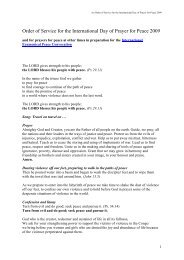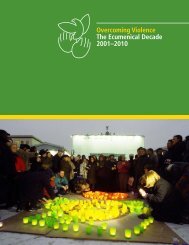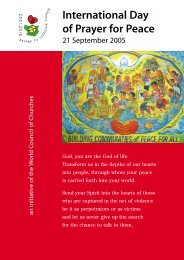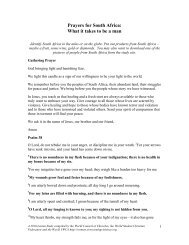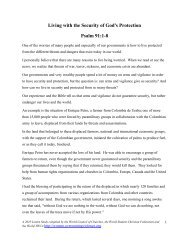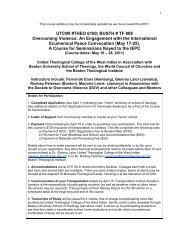Alternative Globalization Addressing Peoples and Earth
Alternative Globalization Addressing Peoples and Earth
Alternative Globalization Addressing Peoples and Earth
You also want an ePaper? Increase the reach of your titles
YUMPU automatically turns print PDFs into web optimized ePapers that Google loves.
27<br />
the 1990s, Argentina had been the star pupil of the IMF, following its<br />
advice to the letter. After a massive programme of privatization <strong>and</strong><br />
adjustment, by 1999 the country found that its debt had ballooned to<br />
$146 billion. When the Argentine crisis deepened, the IMF pledged<br />
more <strong>and</strong> more billions until, in late 2001, the country’s entire economic<br />
system collapsed. Before the implementation of neoliberal policies,<br />
Argentina was a society of 60% middle class. After the breakdown 60%<br />
of the population is under the poverty line.<br />
In Africa, the IMF’s star pupil was Zambia. In a region wracked by<br />
drought <strong>and</strong> ravaged by the HIV/AIDS p<strong>and</strong>emic, Zambia needs all its<br />
available financial resources to support its social <strong>and</strong> agricultural<br />
infrastructure. Instead, it is expected to pay an average of US$221 million<br />
a year in debt service from 2003 to 2005, which is two-thirds more than<br />
it paid prior to receiving debt relief under the HIPC initiative.<br />
The IMF alone is scheduled to extract $293 million in debt servicing<br />
from 2003 to 2005, after providing debt relief through the HIPC<br />
initiative, while Zambians are still paying for misguided policies imposed<br />
by the WB <strong>and</strong> IMF throughout the 1990s. Instead of admitting its<br />
responsibility <strong>and</strong> liability for Zambia’s debt crisis, the IMF remains<br />
fixated on forcing the country to sell its remaining assets. When<br />
confronted with the failure of their approach in Zambia, international<br />
policy-makers hid behind allegations of local government corruption,<br />
rather than examine the true impact of their own policies.<br />
These experiences signify a systemic crisis of the entire global financial<br />
system. No international financial institution, policy regulation or power<br />
is able or willing to control the $1.9 trillion worth of currencies that are<br />
traded every business day. Financial speculation dominates trade in goods<br />
<strong>and</strong> services, diverting resources from long-term productive investments<br />
<strong>and</strong> areas of greatest human need. Financial markets are also increasingly<br />
unstable, with speculative bubbles <strong>and</strong> financial crises.<br />
This risk is unevenly shared. The dominance of the US dollar in<br />
international finance provides the credit that allows the US to create new<br />
liquidity despite being the largest debtor on the planet <strong>and</strong>, among other<br />
things, invest massively in the arms industry to wage geopolitical wars.<br />
The ultimate helplessness of countries that ab<strong>and</strong>on sovereignty over their<br />
currencies, peg their currencies to the dollar or adopt the US dollar or<br />
Euro is tragically illustrated by Argentina. The price is paid by the poor<br />
through loss of jobs <strong>and</strong> savings, hikes in the price of food, burgeoning<br />
poverty <strong>and</strong>, all too often, death.<br />
In “good times”, rich countries create liquidity for themselves through the




